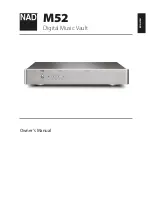
8-28
8.12
Troubleshooting
This section lists the problems that might occur. If you encounter the problems when using the equipment or
accessories, check the table below before requesting for services. If the problem persists, contact your service personnel.
CAUTION
Never try to disassemble the equipment or supplied accessories. There are no internal user-serviceable
parts.
Symptoms
Possible Cause
Correction Action
Noisy ECG traces
Loose or dry electrodes
Apply fresh and moist electrodes.
Defective electrode wires
Replace wires if necessary.
Patient cable or leads are routed too
close to other electrical devices
Move the patient cable or leads away from the
electrical device.
Excessive Electro-surgical
Interference
Wrong ECG cable used
Use ESU-proof ECG cables. For details, refer to 2
4.1 ECG Accessories .
Muscle Noise
Inadequate skin preparation prior to
application of electrode, tremors,
tense subject, and/or poor electrode
placement
Repeat skin preparation as described in
8.3.1
Preparing the Patient and Placing the Electrodes
and re-place the electrodes.
Apply fresh, moist electrodes.
Avoid muscular areas.
Intermittent Signal
Connections not tight and/or properly
secured
Check that the cables are properly connected.
Electrodes dry or loose
Repeat skin preparation as described in
8.3.1
Preparing the Patient and Placing the Electrodes
and apply fresh and moist electrodes.
Cable or lead wires damaged
Change cable and lead wires.
Excessive alarms: heart rate,
lead fault
Electrodes dry
Repeat skin preparation as described in
8.3.1
Preparing the Patient and Placing the Electrodes
and apply fresh, moist electrodes.
Excessive patient movement or
muscle tremor
Reposition the electrodes.
Replace fresh and moist electrodes if necessary.
Low Amplitude ECG Signal
Gain set too low
Set the gain as required. For details, refer to
8.5.3
Changing ECG Wave Settings
.
Electrodes dry / old
Apply fresh and moist electrodes.
Skin improperly prepared
Repeat skin preparation as described in
8.3.1
Preparing the Patient and Placing the Electrodes
.
This could be the patient’s normal QRS
complex
Verify with another well-functioning monitor.
Electrode could be positioned over a
bone or muscle mass
Move ECG patches away from the bone or muscle
mass.
No ECG Waveform
Gain set too low
Set the gain as required. For details, refer to
8.5.3
Summary of Contents for BeneView T1
Page 1: ...BeneView T1 Patient Monitor Operator s Manual...
Page 2: ......
Page 8: ...VI FOR YOUR NOTES...
Page 20: ...12 FOR YOUR NOTES...
Page 38: ...2 14 FOR YOUR NOTES...
Page 56: ...4 8 FOR YOUR NOTES...
Page 64: ...5 8 FOR YOUR NOTES...
Page 116: ...8 30 FOR YOUR NOTES...
Page 130: ...11 8 FOR YOUR NOTES...
Page 138: ...12 8 FOR YOUR NOTES...
Page 140: ...13 2 FOR YOUR NOTES...
Page 174: ...16 12 FOR YOUR NOTES...
Page 190: ...18 10 FOR YOUR NOTES...
Page 206: ...21 6 FOR YOUR NOTES...
Page 246: ...A 20 FOR YOUR NOTES...
Page 274: ...D 8 FOR YOUR NOTES...
Page 285: ...G D Declarat tion of C Conform G 1 mity...
Page 286: ...P N 046 005297 00 15 0...
















































